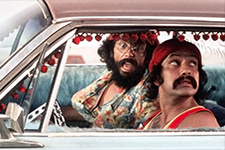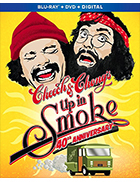Up in Smoke
|  By the time Richard “Cheech” Marin and Tommy Chong—known as the comedy duo Cheech & Chong—made their first feature film Up in Smoke, they were already legendary in the world of stand-up comedy. In the decade following their first meeting in Vancouver, British Columbia (where Cheech was avoiding the U.S. draft), they recorded five comedy albums, one of which (1972’s Big Bambu) was for years the largest-selling comedy recording and one of which (1973’s Los Cochinos) won a Grammy. Thus, they already had a built-in audience for their blissed-out stoner antics on the big screen, but even then the film’s box-office success, which landed it in the top 10 domestic grossers in a year that featured massive hits like Grease, Superman: The Movie, and National Lampoon’s Animal House, was something of a surprise. Because Cheech and Chong had already honed their slacker-buddy art on their albums and years of stand-up comedy performances, it was easy enough for them to slide into a loose road-comedy narrative that played to the strengths of their established personas. Marin’s Pedro De Pacas and Chong’s Antony “Man” Stoner are amiable dopeheads with little ambition beyond scoring their next high, which is pretty much the engine that drives the film. We don’t know much about them outside of that, although we do get an amusing opening scene in which the Man leaves behind his wealthy, bickering parents (Strother Martin and Edie Adams) to pursue ... well, something ... in a car that at first appears to be a Rolls-Royce, but is then revealed to be a beat-up Volkswagen Beetle with a Rolls-Royce grill stolen from his father’s limo tied to the front. The car gives out, which is what leaves the Man stranded on the side of the road for Pedro to pick up, and then they’re off and running. Trying to score some dope, they end up in the crosshairs of Stacy Keach’s overly determined narcotics officer Sergeant Stedenko, who, like all authority figures in such animal comedies, represents oppression, repression, and suppression of all that is good and fun and lively in life. At one point Pedro and Man wind up deported to Mexico (in an amusing twist that plays with particular glee against the backdrop of today’s Trump-driven anti-immigration political rhetoric, everyone being deported is doing it purposefully to get a free bus-ride to a wedding in Tijuana), and later they get caught up in the PTSD-addled antics of Pedro’s friend and drug connection Strawberry (Tom Skerritt) (of course, no one would ever accuse them of being politically correct; two female characters are billed in the credits as “Jail Bait”). They constantly remain one step ahead of Keach’s officious cop, at one point driving a van constructed entirely of marijuana over the border, and not because they’re clever or even really aware of what’s going on, but simply because they always happen to bumble in the right direction. Their blessed toker bliss-out is part of their charm, and the film cruises along on a relaxed, easy-going vibe of alternating verbal and slapstick comedy. Producer Lou Adler, who had produced the duo’s comedy albums and had previously executive produced The Rocky Horror Picture Show (1975), is credited as the director, although it is widely known that Chong managed most of that work, and he was later credited for directing all of their subsequent films: Cheech and Chong’s Next Movie (1980), Nice Dreams (1981), Still Smokin (1983), and Cheech & Chong’s The Corsican Brothers (1984). It’s easy to see how Cheech and Chong first conquered with primarily spoken word albums, because the back-and-forth cadence of their distinctly different voices is humorous in and of itself. Marin’s slightly high-pitched and ethnically exaggerated tones joust and spar and oddly merge with Chong’s long, low hippie drawl; you can just listen to them and it makes you laugh (they both say “man” repeatedly, often beginning and ending their sentences with the word). Like its protagonists, Up in Smoke is a shaggy slice of slacker comedy, and while no one will mistake it for a particularly well-made movie, it is imminently likeable and repeatedly watchable.
Copyright © 2018 James Kendrick Thoughts? E-mail James Kendrick All images copyright © Paramount Home Entertainment | |||||||||||||||||||||||||||||||
Overall Rating: 

 (3)
(3)


